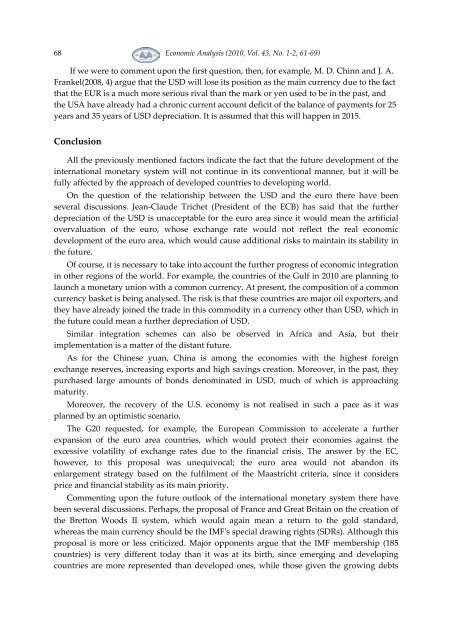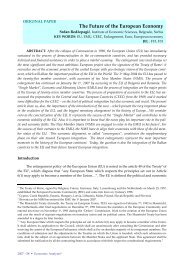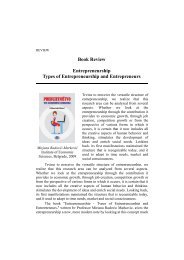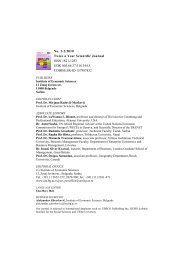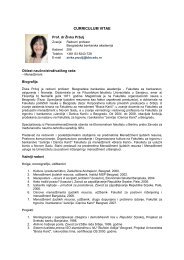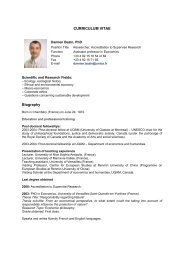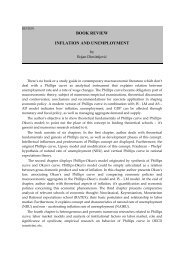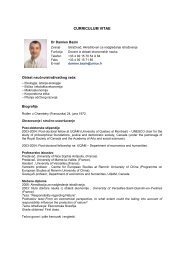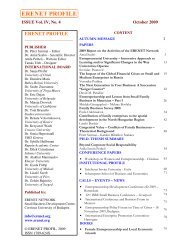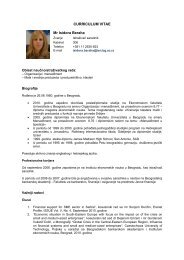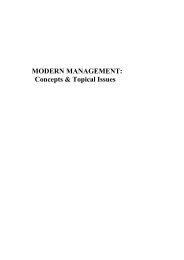Twice a Year Scientific Journal
Twice a Year Scientific Journal
Twice a Year Scientific Journal
Create successful ePaper yourself
Turn your PDF publications into a flip-book with our unique Google optimized e-Paper software.
68<br />
Economic Analysis (2010, Vol. 43, No. 1-2, 61-69)<br />
If we were to comment upon the first question, then, for example, M. D. Chinn and J. A.<br />
Frankel(2008, 4) argue that the USD will lose its position as the main currency due to the fact<br />
that the EUR is a much more serious rival than the mark or yen used to be in the past, and<br />
the USA have already had a chronic current account deficit of the balance of payments for 25<br />
years and 35 years of USD depreciation. It is assumed that this will happen in 2015.<br />
Conclusion<br />
All the previously mentioned factors indicate the fact that the future development of the<br />
international monetary system will not continue in its conventional manner, but it will be<br />
fully affected by the approach of developed countries to developing world.<br />
On the question of the relationship between the USD and the euro there have been<br />
several discussions. Jean-Claude Trichet (President of the ECB) has said that the further<br />
depreciation of the USD is unacceptable for the euro area since it would mean the artificial<br />
overvaluation of the euro, whose exchange rate would not reflect the real economic<br />
development of the euro area, which would cause additional risks to maintain its stability in<br />
the future.<br />
Of course, it is necessary to take into account the further progress of economic integration<br />
in other regions of the world. For example, the countries of the Gulf in 2010 are planning to<br />
launch a monetary union with a common currency. At present, the composition of a common<br />
currency basket is being analysed. The risk is that these countries are major oil exporters, and<br />
they have already joined the trade in this commodity in a currency other than USD, which in<br />
the future could mean a further depreciation of USD.<br />
Similar integration schemes can also be observed in Africa and Asia, but their<br />
implementation is a matter of the distant future.<br />
As for the Chinese yuan, China is among the economies with the highest foreign<br />
exchange reserves, increasing exports and high savings creation. Moreover, in the past, they<br />
purchased large amounts of bonds denominated in USD, much of which is approaching<br />
maturity.<br />
Moreover, the recovery of the U.S. economy is not realised in such a pace as it was<br />
planned by an optimistic scenario.<br />
The G20 requested, for example, the European Commission to accelerate a further<br />
expansion of the euro area countries, which would protect their economies against the<br />
excessive volatility of exchange rates due to the financial crisis. The answer by the EC,<br />
however, to this proposal was unequivocal; the euro area would not abandon its<br />
enlargement strategy based on the fulfilment of the Maastricht criteria, since it considers<br />
price and financial stability as its main priority.<br />
Commenting upon the future outlook of the international monetary system there have<br />
been several discussions. Perhaps, the proposal of France and Great Britain on the creation of<br />
the Bretton Woods II system, which would again mean a return to the gold standard,<br />
whereas the main currency should be the IMFʹs special drawing rights (SDRs). Although this<br />
proposal is more or less criticized. Major opponents argue that the IMF membership (185<br />
countries) is very different today than it was at its birth, since emerging and developing<br />
countries are more represented than developed ones, while those given the growing debts


